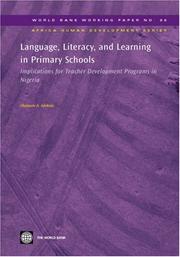| Listing 1 - 4 of 4 |
Sort by
|
Book
Year: 2017 Publisher: Washington, District of Colombia : World Bank,
Abstract | Keywords | Export | Availability | Bookmark
 Loading...
Loading...Choose an application
- Reference Manager
- EndNote
- RefWorks (Direct export to RefWorks)
There are severe geographical disparities in pupil-teacher ratios (PTR) across Malawi, with most teachers concentrated near commercial centers and in rural schools with better amenities. Most of the variation in PTR is concentrated in small sub-district areas, suggesting a central role for micro-geographic factors in teacher distribution. Employing administrative data from several government sources, regression analysis reveals that school-level factors identified by teachers as desirable are closely associated with PTR, including access to roads, electricity, and water, and distance to the nearest trading center, suggesting a central role for teachers' interests in PTR variation. Political economy network mapping reveals that teachers leverage informal networks and political patronage to resist placement in remote schools, while administrative officials are unable to stand up to these formal and informal pressures, in part because of a lack of reliable databases and objective criteria for the allocation of teachers. This study curates a systematic database of the physical placement of all teachers in Malawi and links it with data on school facilities and geo-spatial coordinates of commercial centers. The study develops a consistent and objective measure of school remoteness, which can be applied to develop policies to create rules for equitable deployments and targeting of incentives. Growing awareness of disparities in PTRs among district education officials is already showing promising improvements in targeting of new teachers. Simulation results of planned policy applications show significant potential impacts of fiscally-neutral approaches to targeted deployments of new cohorts, as well as retention of teachers through data-calibrated incentives.
Multi
ISBN: 9789264068780 9264068783 Year: 2009 Publisher: Paris : OECD,
Abstract | Keywords | Export | Availability | Bookmark
 Loading...
Loading...Choose an application
- Reference Manager
- EndNote
- RefWorks (Direct export to RefWorks)
This publication provides quantitative, policy-relevant information on the teaching and learning environment in schools in 23 countries and has a focus on lower secondary education. School effectiveness research consistently shows that the quality of the learning environment is the most important policy-malleable factor for positive student learning and student outcomes. In recognition of this, TALIS explores key policies and practices that shape the learning environment. TALIS illustrates the roles and functions that school leaders adopt within schools - often facing quite different circumstances - and examines how these roles support teachers in their work. Retaining and developing effective teachers is a priority in all school systems and TALIS examines how teachers' work is recognized, appraised and rewarded and how well the professional development needs of teachers are being addressed.--Publisher's description
Elementary school teachers --- Teachers --- Teaching --- Educational surveys --- Educational evaluation --- Statistics --- Statistics. --- Methodology --- Teaching and Learning International Survey --- Education --- Methodology.

ISBN: 1280857781 9786610857784 0821370499 0821370480 Year: 2007 Publisher: Washington, D.C. : World Bank,
Abstract | Keywords | Export | Availability | Bookmark
 Loading...
Loading...Choose an application
- Reference Manager
- EndNote
- RefWorks (Direct export to RefWorks)
Language, Literacy, and Learning in Primary Schools is a synthesis of the findings arising from four years of policy research and development in Nigeria's primary schools that focused on the gap between what teachers should know and be able to do, and the realities of teaching and learning in classrooms. It begins by critically examining the outcomes of primary schooling as measured by learning achievement results from national assessments, and by identifying some core learning problems for Nigerian primary school children. It reviews the findings from recent research reports that studied teac
Elementary school teachers --- Education, Elementary --- Training of --- Curricula --- Children --- Elementary education --- Primary education (Great Britain) --- School children --- Education (Elementary) --- Education --- Teachers
Book
ISBN: 9789264056053 926405605X 9264068783 9789264068780 Year: 2009 Publisher: Paris : OCDE, Teaching and Learning International Survey,
Abstract | Keywords | Export | Availability | Bookmark
 Loading...
Loading...Choose an application
- Reference Manager
- EndNote
- RefWorks (Direct export to RefWorks)
This publication is the first report from the International Teaching and Learning Survey (TALIS). It provides quantitative, policy-relevant information on the teaching and learning environment in schools in 23 countries and has a focus on lower secondary education. School effectiveness research consistently shows that the quality of the learning environment is the most important policy-malleable factor for positive student learning and student outcomes. In recognition of this, TALIS explores key policies and practices that shape the learning environment. The important role that school leadership can play in creating effective schools is well documented. TALIS illustrates the roles and functions that school leaders adopt within schools – often facing quite different circumstances - and examines how these roles support teachers in their work. Retaining and developing effective teachers is a priority in all school systems and TALIS examines how teachers‟ work is recognised, appraised and rewarded and how well the professional development needs of teachers are being addressed. Perhaps the most innovative aspect of TALIS is the insights it provides on the teaching beliefs that teachers bring to the classroom and the pedagogical practices that they adopt. TALIS cannot measure which practices or beliefs are most effective but it does show how these associate with some of the conditions that are pre-requisites for effective schooling.
Education --- Teaching --- Enseignement --- Statistics --- Methodology --- Statistiques --- Méthodologie --- Project method in teaching. --- Onderwijs 37 --- Onderwijspersoneel 371.12 --- Leermethoden 371.3 --- Méthodologie --- Methodology. --- Elementary school teachers --- Teachers --- Educational surveys --- Educational evaluation --- Statistics. --- Teaching and Learning International Survey
| Listing 1 - 4 of 4 |
Sort by
|

 Search
Search Feedback
Feedback About UniCat
About UniCat  Help
Help News
News